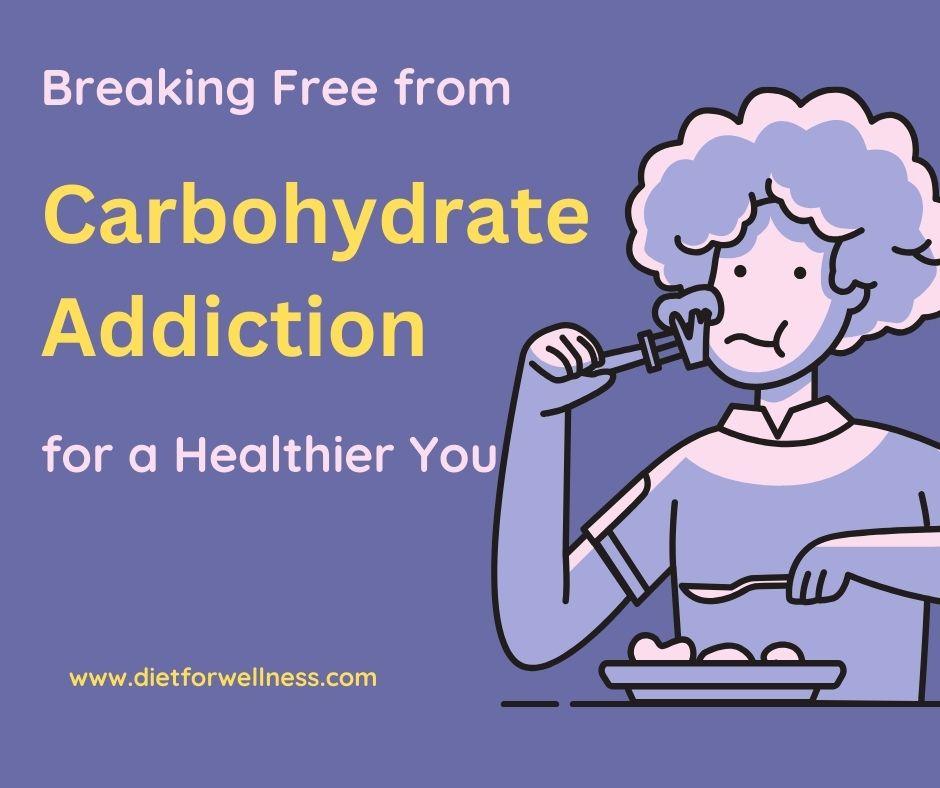The Impact of Carbohydrate Addiction on Weight and Health
Carbohydrates are a fundamental component of our diet, providing us with energy and serving as a primary source of fuel for our bodies. However, in recent years, there has been growing concern about the impact of carbohydrate addiction on weight and overall health.

How?
With food delivery apps always on their toes to satisfy our cravings for junk food, we have too much carbohydrate on our plates, than actually needed by our body.
We find ourselves trapped in a cycle of craving and overconsumption of high-carb foods, which can lead to significant negative consequences for our well-being.
Simple & Complex Carbohydrates- The types and their effects on the body
Carbohydrates are often divided into two categories- simple and complex.
Simple carbohydrates, like those found in sugar and processed foods, are quickly absorbed into the bloodstream, causing a spike in blood sugar levels and a subsequent crash. This rollercoaster effect can lead to carbohydrate addiction, as people seek the temporary relief and pleasurable sensation that comes with consuming these foods.
One of the primary impacts of carbohydrate addiction is on weight management. High-carb diets can lead to overeating and weight gain, primarily due to their effect on appetite regulation. Consuming an excess of carbohydrates, especially simple sugars, can disrupt the hormones that control hunger and satiety, making it difficult for individuals to control their food intake. This causes a continuous cycle of overeating as well as weight gain.
Carbohydrate addiction also has a profound impact on insulin resistance, a condition where the body’s cells become less responsive to insulin, a hormone that regulates blood sugar levels. As a result, the pancreas produces more insulin to compensate, which can lead to chronically elevated insulin levels. High insulin levels are associated with fat storage, particularly in the abdominal area, making it harder to lose weight and increasing the risk of developing conditions such as type 2 diabetes.
Furthermore, the type of carbohydrates consumed plays a crucial role in the impact on weight and health. Refined and processed carbohydrates, such as white bread, sugary snacks, and sugary drinks, are more likely to trigger addictive behaviors due to their rapid digestion and absorption. On the other hand, complex carbohydrates, found in whole grains, fruits, and vegetables, are digested more slowly, providing a steadier source of energy and reducing the likelihood of addiction.
The impact of carbohydrate addiction on health is not limited to weight gain and insulin resistance. It can also affect mood and mental well-being. Carbohydrate-rich foods often provide a temporary boost in serotonin, a neurotransmitter associated with feelings of happiness and relaxation. This is why many people turn to comfort foods when they’re stressed or upset. However, the temporary relief comes at a cost – over time, excessive consumption of high-carb foods can lead to mood swings, irritability, and even depression.
Breaking free from carbohydrate addiction and its associated impacts on weight and health can be challenging but is essential for overall well-being.
Strategies to help combat carbohydrate addiction
Reduce refined carbohydrates- Cut back on foods like sugary snacks, white bread, and sugary drinks. Instead opt for fruits, whole grains, and vegetables.
Balanced meals- Ensure that your meals contain a mix of macronutrients, including protein and healthy fats, to help stabilize blood sugar levels and reduce cravings.
Mindful eating- Keep a close check on your body’s hunger as well as fullness cues. Eating mindfully can help you better regulate your food intake.
Support and accountability- Seek support from a registered dietitian, therapist, or support group to help you address the emotional and psychological aspects of carbohydrate addiction.
Regular physical activity- Exercise can help regulate blood sugar levels and improve mood, reducing the need for emotional eating.
Final thoughts,
Carbohydrate addiction can have a significant impact on weight and health.
Overconsumption of refined carbohydrates can lead to weight gain, insulin resistance, and emotional disturbances. To mitigate these effects, it’s important to make informed dietary choices, break the addiction cycle, and seek support when needed. By doing so, individuals can improve their overall health and well-being and reduce the negative impact of carbohydrate addiction on their lives.
